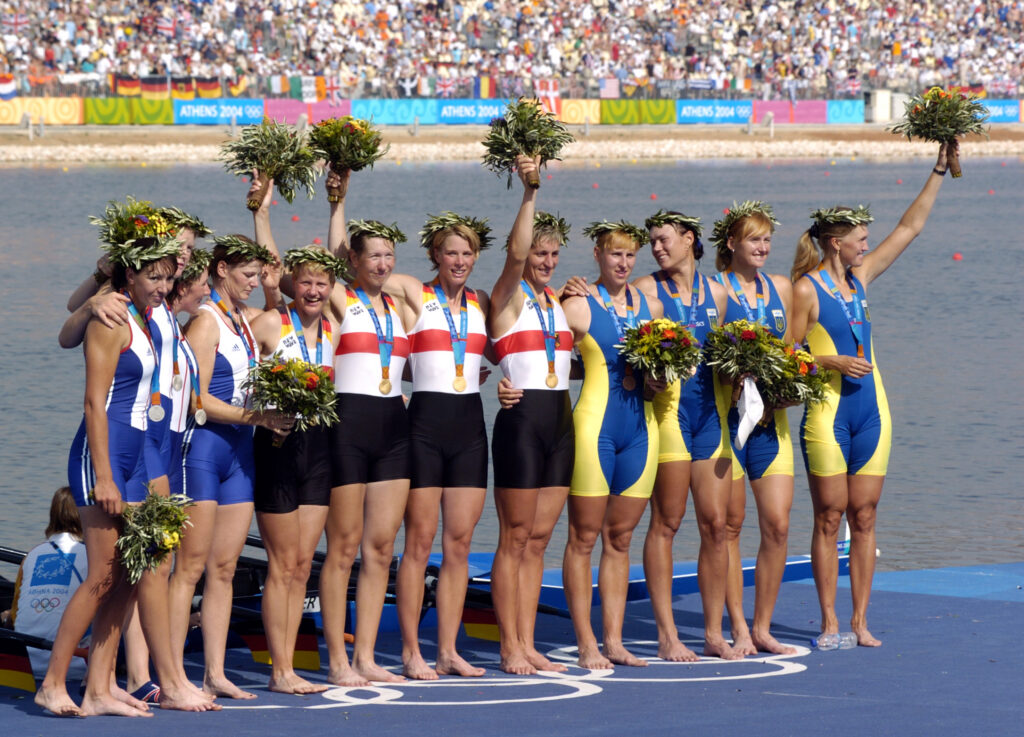
27 Nov 2023
Where are they now: Kathrin Boron
She sits in fourth place on the all-time Olympic gold medal count for women with four Olympic golds and a bronze. She holds the top place for Germany and is a Thomas Keller Medal recipient. She’s Kathrin Boron of Germany.
Boron knew from a young age she wanted to be an athlete. Rowing, though, at that stage was far from being on her radar. Athletics was her thing. Growing up in East Germany, Boron had access to an advanced and competitive sports system which included sports schools for youth. She tried to get in for athletics and wasn’t selected for not demonstrating ‘age-appropriate performance’.
But, Boron says, rowing criteria was different. It required ‘an appropriate age-related body size and a level of fitness.’ Being able to row was not a requirement. Boron met the requirements and moved into a sports boarding school. Her rowing career began.
Through Boron’s years as a junior rower she was part of the East German system and raced to gold at the World Rowing Junior Championships in 1986 and 1987.
With the reunification of East and West Germany, sporting conditions changed. She had already won two junior world championship titles and two senior world championship titles and was heading towards the 1992 Barcelona Olympic Games.
“In the former East Germany as a successful competitive athlete you were well looked after and protected,” says Boron. “There was a well organised school sport system and after that professional support.”

After reunification every athlete, says Boron, was responsible for themselves and it was hard for us to reorientate to this new life.
“Many athletes ended their sports career early.
“It took me some time to work out how to have a sports career and a vocation. I dropped out of studying sports and started training in banking. This decision was the foundation for my long and successful sports career.”
The training and racing German rowers did not change. Boron continued at the former East German training centre in Potsdam.
Boron went on to race in every sculling boat through her international career and names the double sculls as her favourite boat to row in gaining Olympic gold in Barcelona and Sydney.
Now long retired, Boron looks back at her long and illustrious rowing career and says it’s difficult to pull out a highlight.
“To successfully experience five Olympic Games is something extraordinary. Winning an additional eight world championship titles underlines my long-standing sports career. “What perhaps stands out to me is the comeback after my “maternity break”. The birth of my daughter in 2002 is my personal highlight outside of sport and yet I cannot view this experience entirely in isolation from sport.”
Retirement came as a natural progression for Boron. She had always planned to “go away” with a great sporting result and to do this at the moment before being passed by younger rowers.
“I knew very precisely how to assess my athletic performance. For this reason it was clear to me that the 2008 Olympic Games would be my last and that the final would also be my last race. I haven’t competed since then.”
Although trained in banking, Boron’s career remained sports related. She moved to working in marketing and public relations at the Potsdam Olympic base. She then became a trainer before moving with the family away from Potsdam to work for Deutsche Sporthilfe which supports athletes on their road to success. “Working for them was always a dream of mine. Especially since they supported me through my own sports career.”
Most recently Boron has moved to the Lower Saxony Olympic Training Centre where she advises athletes on their dual careers. “I am very grateful for my sporting career and my life today. I strive to pass on my diverse experiences in my current job to young people.”
Boron has remained connected to rowing and, although no longer living in Potsdam, she is a member of the Potsdam Rowing Club. She is hoping to join her local club and perhaps go rowing next summer and she stays up-to-date with the German national team, following their international competitions.
“I will always remain connected to rowing in my own way, especially in my heart. Rowing and competitive sport in general has shaped me as a person and personality.”
She keeps fit and doing a variety of sport and rides her bike to work and home every day.

